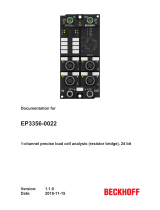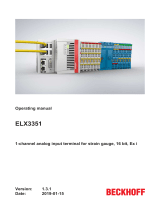Page is loading ...

Strain sensors
DST55R
Robust strain sensor for harsh outdoor
environment, voltage signal
2019-12-20:
81296831
www.baumer.com
Baumer Electric AG
Hummelstrasse 17
CH-8501 Frauenfeld
Phone +41 (0)52 728 1122
Fax +41 (0)52 728 1144
Operating Instructions
Safety
Intended use
This product is a precision device designed
for the detection of objects, the acquisition of
physical measuring units and for the evaluation
of measured values for output in the form of
electrical signals for the higher-level system.
Unless not especially labelled, the product must
not be used in potentially explosive atmospheres.
Commissioning
Installation, mounting and adjustment of this prod-
uct may only be executed by skilled and authorized
personnel.
Installation
Only use the provided mounting devices and
accessories for product installation. Outputs not
used must not be assigned. Unused strands must
be isolated. Do not exceed the cable’s maximum
permissible bending radius. Prior to electrical con-
nection of the product, the system must be down
and not live. Where mandatory, use shielded cables
for protection against electromagnetic interference.
Where using pre-assembled connectors at shielded
cables, customer must ensure the connector is
EMC-compliant. The cable shield must rest on the
connector with a sufciently large contact surface.
Scope of delivery
Article Quantity
Sensor 1
Screw, stainless (M8 x 35, A4-80) 2
Construction and function
1
2
3
1 Strain direction
2 Connector plug (M12 x 1; 5-pin, male)
3 Mounting holes
The sensor is screwed to a machine element
and measures its strain. Changes in strain
are measured using strain gauges and converted
into an electric signal. If the sensor experiences
a tensile force, the signal is positive, and it
is negative in case of a compression.
Signal word
ATTENTION In situations that can lead
to property damage.
Transport and storage
ATTENTION
Damage to the sensor due to falling.
f Do not drop the sensor in its unpackaged condition.
f Check packaging and sensor for damage.
f In the event of damage: Do not use sensor.
f Transport or store the sensor only in its original packaging.
f Store sensor where it will be secure against shock.
Storage temperature: –40 … +85 °C
Preparing for mounting
Important
The sensor provides inaccurate measurement results when the measuring surface is dirty or when the sensor
is incorrectly mounted.
f Avoid contamination from grease or oil.
f Mount the sensor on a machined, at surface.
f Observe surface roughness.
0,1
f Check for evenness tolerance.
Evenness tolerance ≤ 0.1 mm
Ra 6,3
f Check for surface roughness.
Ra ≤ 6.3 µm
54,5 mm
21 mm
f Drill 2 threads in machine element.
Depth boreholes: min. 21 mm
Distance between boreholes: 54.5 mm ± 0.1 mm
Screws: M8 x 35
Ø 0,1
Make sure that boreholes are drilled
perpendicular to the contact surface
of the sensor.
Mounting
f Make sure that the machine element
is not loaded.
f Hand-tighten the fastening screws.
f Tighten the SW6 hexagonal socket fastening
screws using a torque wrench.
Tightening torque: 22 Nm

Operation
Depending on the application, the sensor can be
cyclically tared by the machine control to compen-
sate for zero drift or temperature inuences.
f Make sure that the sensor does not experience
a change in strain.
f Make sure that the machine is in the correct
zero position.
f Tare the sensor at zero load.
Maintenance and repair
Maintenance
Regular maintenance is not required.
Repair
f Do not repair the sensor yourself.
f Send damaged sensor to Baumer.
Contact addresses can be obtained from
www.baumer.com.
Disposal
f Do not dispose of in household waste.
f Separate materials and dispose of in
compliance with nationally applicable
regulations.
Applicable documents
For general information, see insert.
For technical data, see data sheet:
www.baumer.com
For accessories see www.baumer.com
FAQ
What happens with an output signal between
10 and 12 volts?
Baumer recommends that the further processing
of the output signal be designed so that a signal up
to ±12 V can be processed. Accurate measurement
results are achieved with an output signal up to ±10 V.
However, the output signal may also be slightly
higher than 10 V due to temperature inuences.
The sensor does not output a stable signal.
Why is that?
The sensor is not rmly screwed on. To obtain stable
measurement results, the sensor must be rmly
screwed onto a machine element.
Is an additional protective housing required?
The sensor is protected against ingress of dust and
water. In case of excess mechanical load, through
ying stones, for example, a mechanical protective
housing is recommended.
Can I also use other screws?
The enclosed screws are high-strength, stainless
screws (M8 x 35 mm, A4-80) with strength class 80.
To obtain an accurate strain measurement, the same
screws must be used.
Electrical connection
Important
For stable measurement results, the sensor must be mounted correctly.
f Provide a supply voltage of 18 to 33 VDC (UL class 2).
For a UL 1310 installation, the device must be
protected using a UL-listed fuse (nominal current:
max. 5 A at 20 VDC or ≤ 100 W/VDC [A]).
f Switch off the supply voltage before connecting.
f Connect the sensor according to pin assignment.
Use shielded connection cables with a maximum
length of 10 m.
Pin assignment
1
2
43
5
1 +Vs
2
–V
OUT
3 GND
4
+V
OUT
5 Zero
adjustment
Housing Shield
In order to meet the PELV requirements according to EN 60204-1, § 6.4.1, it is recommended to connect
GND to protective earth at one point.
Dehnungssensor /
strain sensor
Steuerung /
control unit
GND
2
2
R
L
3
3
1
1
Tare
-V
OUT
+V
s
+V
OUT
potential equalization
U
Potentialausgleich /
4
4
5
5
supply voltage +Vs: 18 - 33 VDC (UL-Class 2)
load resistance RL: >10 kΩ
output signal Vout: ±10 V
tare function tare: 5 - 33 VDC
Initial commissioning
f Connect sensor.
f For a stable zero point: screw on sensor rmly warm-up sensor 3 minutes with power supply switched on.
f To minimize the impact of setting behavior, load the sensor to full load 10 times if possible.
f Tare the sensor at zero load to compensate for signal changes during mounting.
Ta re
t
3
t
1
t
2
U
V
OUT
ε
V
OUT
Output signal
ɛ Strain
Tare Zero adjustment input
t
1
Zero adjustment delay (< 0.3 ms)
t
2
Zero adjustment time (< 5.0 ms)
t
3
Zero adjustment pulse (> 1.0 ms)
/

